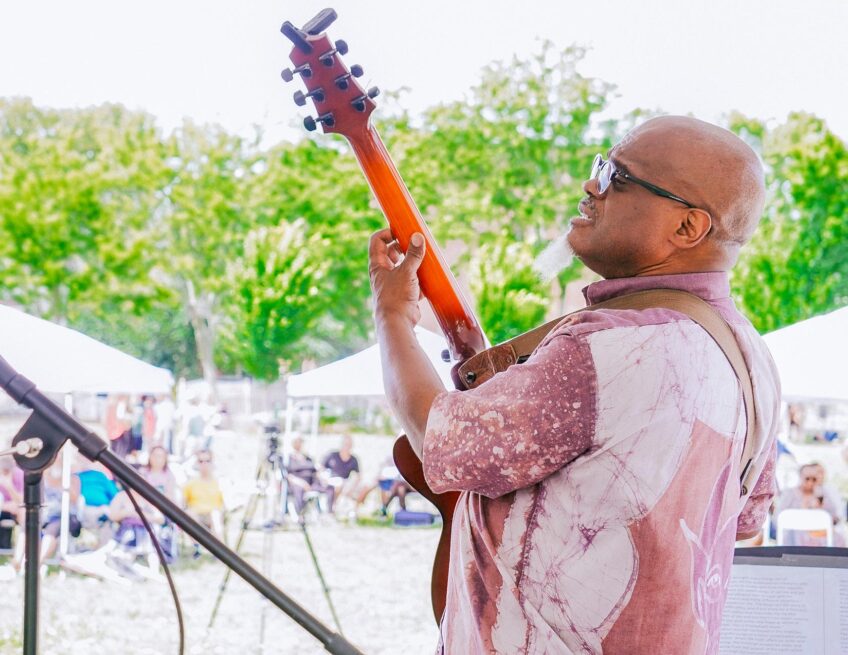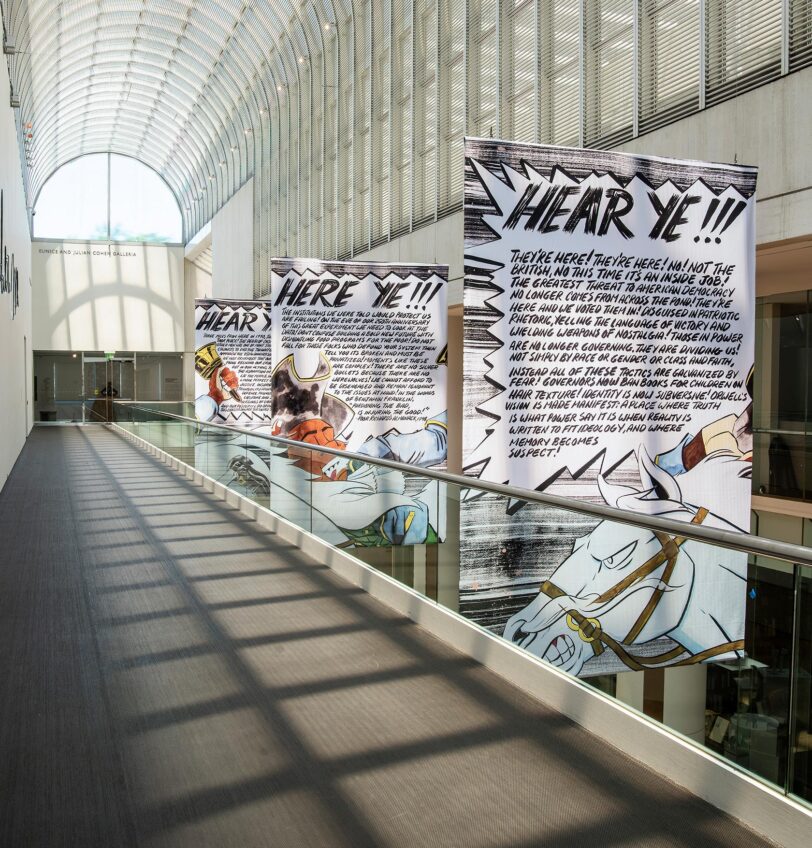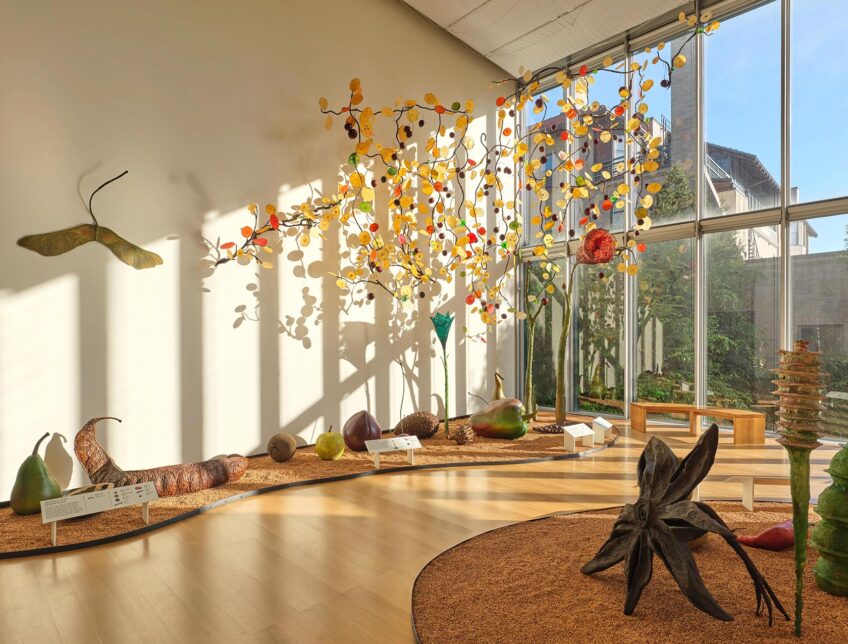Tom Everett created, over 40 years as director of bands at Harvard University, a home for jazz on the Cambridge campus. Generations of Harvard students and the public experienced jazz through intimate encounters with many of the greatest living players.
Everett retired in February and at Harvard’s Sanders Theatre Saturday night, nearly 1,000 of his former students, colleagues and friends attended a celebratory concert.
With a beaming Everett in the audience with his wife Betsy, his legacy was on display in the form of Harvard’s two accomplished undergraduate jazz bands: the Sunday Jazz Band and the Monday Jazz Band. Wearing tuxedoes and wielding their gleaming instruments with skill and passion, each band had a full-strength brass section – five saxophones, four trumpets, four trombones – and a rhythm section of piano, acoustic bass and drums.
Two of Everett’s protégés, the distinguished saxophonists, composers and bandleaders Joshua Redman (’91) and Don Braden (’85) joined the students as guest artists.
The program’s 12 works included compositions by Benny Carter and Phil Wilson as well as two of Everett’s own picks, Duke Ellington’s “Second Line” (1970) and “Body and Soul” (1930), written by Johnny Green ’28 and arranged by Joe Henderson, reflecting Everett’s ecumenical taste and honoring some of his guest artists over the years,.
Assistant Director of Bands Mark Olson conducted the Sunday Jazz Band. Leading the Monday Jazz Band was Braden, its 2013 guest conductor.
Conjuring the shifting rhythms and group improvisations of Charlie Mingus that he explored as a student, Braden expressed his gratitude to Everett by leading the band in a soaring rendering of his composition, “For-Ever-ett.”
Redman, performing with joy and fire, funneled his own praise to Everett through his saxophone. After playing two of his own compositions accompanied by the band, Redman joined pianist Aaron Goldberg (’96) bassist Ron Mahdi and percussionist Yoron Israel in a lyrical chamber rendering of John Coltrane’s “Wise One.”
Unfolding like a psalm, the composition begins with a solo that, as played by Redman, evoked the plaintive sound of the Jewish ceremonial horn, the shofar. Redman and Goldberg entered a spare dialogue to Israel’s rumbling drums and Mahdi’s intricate backbeat and followed the music as it morphed into a danceable passage and then made its alternatively wrestling and gliding ascent to a serene close.
A short film introduced by Harvard’s president, Drew Gilpin Faust, contained glimpses of memorable guest performances, including a student playing piano alongside Randy Weston, Carla Bley preparing students to perform her composition “Egyptian,” and tap great Jimmy Slyde performing “David Danced before the Lord” from Ellington’s Sacred Concert.
The evening concluded with a rousing version of the Sonny Rollins classic, “St. Thomas.” As castanet-shaking alumni streamed down the aisles and onto the stage, vocalist Samara Oster (’13) led the assembly in singing customized lyrics, which thanked Everett for “40 years, jazz and cheers.”
Everett, a graduate of Ithaca College Conservatory of Music, performed as a bass trombonist with big-name jazz bands before joining Harvard in 1971 as its director of bands. Back then, except for the winter jazz parties on WHRB-FM, the Harvard radio station, jazz had no place on the campus. Everett made it his business to change that.
“Jazz offers so many unique opportunities for someone to grow, create, and learn to interact with other people,” Everett told a WHRB interviewer before the concert. “An educated person shouldn’t leave Harvard without knowing at least Louie Armstrong, Charlie Parker, Lester Young and Duke Ellington.”
Academic and jazz worlds met and cross-pollinated in Everett’s classes and programs, which brought together the public as well as students and artists. All were welcomed with Everett’s warmth and drawn by his far-ranging knowledge.
Everett, an enthusiastic crusader, introduced students to the joys and risks of improvisation, coaxing them to challenge themselves and each other with a great sense of humor and fun as well as hard work.
While directing four undergraduate bands, a year into his job, he also established the Harvard Summer Pops Band, which is open without audition to all, regardless of age or experience.
In 1973, Everett introduced the university’s first jazz course for academic credit through the Harvard Extension School. Everett often brought in guest artists in town for club dates. In 1976, Everett introduced the annual Harvard University Jazz Masters in Residence program, which each year engages a guest artist in clinics, rehearsals, public conversations, concerts and often, a commissioned work.
Honoring Everett has hosted a succession of his personal heroes, such artists as Joe Williams, Zoot Sims, Lee Konitz, Dave Brubeck, Sabby Lewis, Alan Dawson, Bill Evans, Roy Hargrove, Hank Jones, Illinois Jacquet, Jim Hall, Max Roach, John Lewis, Eddie Palmieri, Jon Hendricks, Steve Lacy, Randy Weston, Mario Bauza and Benny Golson.
“Jazz is no longer underground at Harvard,” Everett told the interviewer on WHRB, which programs jazz shows five days a week. “It’s really grown, but not half the distance it can go.”






